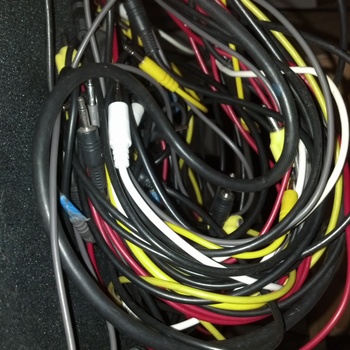There are two kinds of drone artists out there, and both offer something valuable to our broader musical discourse. The first is musical drone: here I’m thinking of people like Rachel Evans, Brian McBride, early Dan Lopatin, and Liz Harris, who use the tools of drone music to create something that’s ultimately greater than the sum of its parts. Such artists explore the tensions between inertia and change, noise and silence, harmony and discord, even lengthiness and brevity; just like more traditional songwriters, they explore these tensions as a means to a less tangible end, one that’s defined more by musicality than by process or strict experimentation-for-its-own-sake. Their works are aesthetic, enigmatic, unexpectedly emotional, and often beautiful.
Then there’s the other kind of drone artist, the kind who absorbed the lessons taught by people like Eliane Radigue, Paulie Oliveros, and LaMonte Young that the process by which sound is created is just as (if not more) worthy of artistic consideration as whatever nebulous end result might be achieved. Eleh, Replica-era Dan Lopatin, and M. Geddes Gengras are perhaps the most prominent (“prominent”) examples of this type of drone artist, and their works are to my ears no less beautiful. But they’re not as concerned with music as they are with sound; the aesthetic quality of their work is not so much the result of conscious craftsmanship as it is a happily random byproduct of their technological experimentation. If Evans and Harris write songs and McBride composes movements, then someone like Gengras could be said to be logging the output of his machines in real time.
On his Bandcamp page, Gengras describes Systems 0 as “generative long-form pieces for modular synthesizer, performed by the machine.” I think this quite succinctly encapsulates the difference between the two kinds of drone artists I’ve described. Even in its most abstract and robotic moments, the work of, say, Rachel Evans is always clearly the result of human intervention and artistry; I doubt she would claim that her music has been “performed by her machines.” In fact, to imply otherwise seems almost like an insult–oh, anyone with a hard drive and a Buchla 200e can do that. But it’s not like Eleh or Suum Cuique just plug in their machines and then sit back and relax; rather, I believe their attention is simply directed elsewhere. If Evans sculpts her sounds, then Gengras sculpts the environment in which his sounds are produced. So a work such as Systems 0 is indeed “performed by the machine,” but the way the machine’s performance is manifest and edited is still certainly the result of human endeavor.
Systems 0 is a two-and-a-half-hour exploration of what a synthesizer sounds like when it’s speaking its native tongue; it’s a veritable field recording from inside the microchip. The album cover is aptly chosen: a tangle of wires and cords, some of which don’t appear to even be plugged in. This might sound like a recipe for pretentious, unbearable disaster, but Gengras–who by this point is no stranger to the game of modular synthesis–manages to coax a remarkable variety of noises from his big mechanical boxes. On this release, his synths tiptoe, crackle, prattle, whistle, bellow, whir, flow, twinkle, screech, float, echo, fall in and out of harmony like a Möbius strip of dominoes, play with both the lowest of bass tones and higher, occasionally shriller registers, and generally meander about a controlled space for a cacophony of sound.
This is very much drone music, though the tones we hear don’t necessarily do all that much droning and some will surely question whether this stuff is “music” in the first place. But drone music can be just as much about repetition and subtle variance as it is about more stereotypical monoliths of sound. Such is the case here. On “3,” for instance, the synth tones almost seem to be talking to each other, ricocheting and quivering across the listener’s head space, sometimes letting each other speak but other times eagerly interrupting each other, just like people do. At the three-minute mark, Gengras introduces a vocal sample: it’s Lil Wayne, discussing “the difference between you and I” from “You Love Me, You Hate Me.” A couple minutes later, a bouncing arpeggio begins to envelop his soliloquy, and by the seven-minute mark Weezy’s voice has been thoroughly absorbed into the mechanical stew of beeps and chirps and faint, fragmented hints of what might have been melody in another universe. By introducing and then incorporating Lil Wayne’s famously gravelly speaking voice into this work, perhaps Gengras wishes to highlight the different “voices” synths can have as well: raspy or clean, static or trembling, high-pitched or low. Then again, maybe Gengras just thinks it’s funny to sample Lil Wayne on an abstract electronic drone album.
Or perhaps Gengras doesn’t really know why he did it either; after all, this is the machine’s performance, not just his, and it doesn’t dwell too long on the stoned ruminations of a famous rapper. In contrast to the excited chaos of “3,” the tones on “4” sound positively mournful, riding a single haunting four-note melodic phrase (!) for the entirety of its fourteen-and-a-half minutes, dressing it up along the way in reams of static, dissonant stabs, and bits and pieces of what sounds like a fax machine dialing into some lonely real estate office somewhere on Jupiter. It’s just one example of the multifaceted connotations and feelings Systems 0 evokes–connotations that somehow sound remarkably human, despite their robotic origins. It’s all in all a wonderful, mesmerizing performance by Gengras’s machines. Do modular synthesizers accept bouquets?

